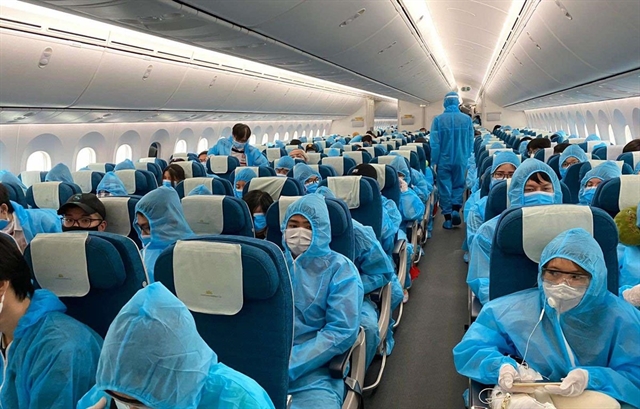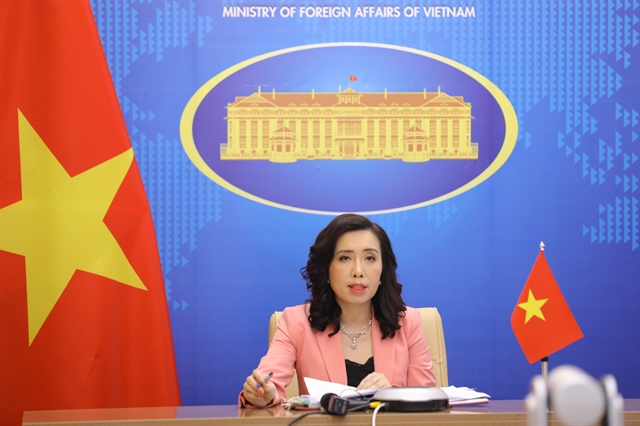 Politics & Law
Politics & Law


|
| Vietnamese citizens in full protective suits and masks on a repatriation flight. — VNA/VNS Photo |
HÀ NỘI — Việt Nam for the time being has no plans to adjust its current foreign arrivals policies, including mandatory 21-day quarantine, the foreign ministry spokesperson Lê Thị Thu Hằng confirmed.
She made the statement during Thursday's press briefing, amid calls from business groups like the American Chamber of Commerce in Hà Nội to relax quarantine policies especially for vaccinated travellers in a bid to bring more people to Việt Nam.
Việt Nam however is suffering from a devastating fourth wave of infections that has so far logged over 3,000 confirmed cases in just one month since April 27, 2021, after internationally-recognised successful containment since the pandemic began earlier last year with a range of measures from strict border closures to effective contact tracing, targeted testing, quarantine management, and lockdown policies.
Earlier this month, the quarantine period for foreign arrivals and direct contacts of confirmed COVID-19 patients was extended from 14 to 21 days.
The country also does not have yet any specific policy towards those who hold the so-called vaccine passports proving that they have been fully inoculated against COVID-19, Hằng said, adding that the country can modify policies based on the circumstances at the time.
“Amid the complicated developments of the coronavirus pandemic around the world and in Việt Nam, policies and measures pertaining to monitoring and quarantining of people entering Việt Nam is always flexibly adjusted by the Vietnamese Government so as to both prevent the transmission of the virus to protect public health, and to resume business activities and economic growth,” she said.
Under the direction of the National Steering Committee for COVID-19 Prevention and Control, the foreign ministry said it is working with relevant authorities, including the health ministry, to develop appropriate guidance on quarantine protocol for foreign arrivals which would take into account factors such as vaccination, time of stay in Việt Nam, and outbreak situation at home and abroad.
As vaccine passports are being carried out in many countries, authorities have been conducting studies and assessment of the policy, she said, adding that the foreign ministry is aggregating experience from countries implementing the initiative so that proposals could be made to the Government on the opening of the border.
Vaccine sources
Việt Nam has to date successfully reached deals with AstraZeneca (30 million doses order), Pfizer/BioNTech (31 million doses order), and the global vaccine sharing scheme COVAX Facility (committed 30 million doses) to provide COVID-19 vaccines to Việt Nam, the spokesperson noted.
However, the supply is still limited and the imported amount has not met the domestic demand, and Vietnamese authorities, including Vietnamese diplomatic missions overseas, are still actively in talks with many other countries and suppliers/manufacturers to diversify access to vaccines and expand the vaccination rate among the Vietnamese population as well as foreigners residing, studying, and working in Việt Nam and soon repel the pandemic, Hằng said.
The Vietnamese Government has also recently established a COVID-19 vaccine fund to receive, manage, and put to use donations pertaining to vaccines so that the resources can be utilised in administering, manufacturing, researching or importing COVID-19 vaccines, the foreign spokesperson said.
The foreign ministry spokesperson also advised caution regarding advertisements about vaccine tours on Vietnamese social media, which claimed to provide one-way tickets to destinations like the US that have been enjoying abundant stockpiles of COVID-19 vaccines to get the jabs, amid domestic shortages.
“At the moment, citizens need to be cautious about making such trips as advertised given that entry and exit policies in many countries remain tightened due to complicated developments of the pandemic. Citizens should verify the advertisement’s information with Vietnamese diplomatic missions overseas,” Hằng said.

|
| Spokesperson for the Ministry of Foreign Affairs Lê Thị Thu Hằng during virtual press briefing on Thursday. — VNA/VNS Photo |
Coronavirus origin investigation
Regarding questions over growing calls from many countries, including the US, asking China to be more transparent and cooperative regarding the international investigation into the emergence of the SARS-CoV-2 during the early days of the outbreak in Wuhan, Hằng said that currently researchers, experts, and scientists are still working on the origin and the nature of the virus.
"We believe that against the current serious developments of the pandemic, with many new strains and mutations of the coronavirus, the international community should step up cooperation and enhance information sharing and experience exchange in research so that better vaccines and treatment regimes for COVID-19 can be developed,” the spokesperson said.
“With the highest sense of responsibility, Việt Nam stands ready to work closely with the international community to together fight the pandemic and soon bring it under control,” she added.
COVID-19 hate crime act
Regarding Việt Nam’s reaction to the COVID-19 Hate Crimes Act recently signed into law by US President Joe Biden following numerous attacks on Asian Americans in the wake of the COVID-19 pandemic, Hằng said Việt Nam “pays keen attention to the protection and the upholding of stability, safety, and the lawful rights and interests of the Vietnamese community overseas.”
“In that spirit, we welcome the signing of the COVID-19 Hate Crimes Act by the US President to aim at curbing violence against the Asian American community,” she added.
Việt Nam hopes that the Asian communities – including people of Vietnamese origin communities – who are residing, working, and studying in the US would have their safety ensured and that they would have equal access to healthcare, education, social services, and jobs, so that they can continue to make active contributions to their host country, which in turn, will help foster the US-Việt Nam Comprehensive Partnership, the spokesperson remarked. — VNS